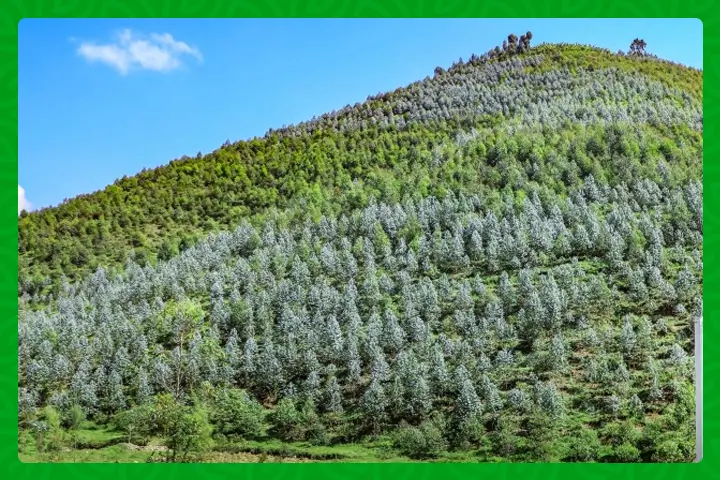
Imagine if your woodlands, spanning a modest two hectares, could become catalysts for climate finance by mitigating carbon emissions. This groundbreaking concept is now a reality, thanks to the innovation of Rwanda-based start-up, Ayambe Zero. With a vision as bold as it is brilliant, Ayambe Zero aims to empower 20,000 green projects, including those in the forestry sector, to sell carbon credits globally between 2023 and 2030. In this article, we delve into the details of this pioneering initiative and its potential to transform the landscape of climate finance and environmental sustainability.
Unveiling Climate Finance Solutions:
Ayambe Zero, led by its visionary founder and CEO, Alex Kalanda, has set out to revolutionize the world of climate finance. Their innovative approach involves calculating the amount of carbon emissions that green projects can potentially reduce and then connecting them with eager buyers of these reduced emissions. It’s a win-win scenario, as these projects not only contribute to mitigating climate change but also generate financial resources for their continued growth.
Understanding Carbon Credits:
At the heart of this initiative lies the concept of carbon credits, which represent measurable and verifiable emission reductions from certified climate action projects. These projects work tirelessly to reduce, remove, or avoid greenhouse gas emissions. Each carbon credit signifies a tonne of carbon emissions removed from the atmosphere, and Rwanda has set a benchmark price of at least $30 per tonne, although prices may vary depending on the project’s impact.
A Global Framework for Change:
This endeavor aligns seamlessly with the goals of the Paris Agreement, a landmark accord aimed at reducing carbon emissions to combat the effects of climate change. It allows nations, companies, or entities to invest in carbon-cutting projects in other regions and count the avoided emissions towards their own climate targets. In essence, it’s a mechanism where polluters compensate for the emissions they generate by supporting green initiatives.
A Visionary Leader:
Alex Kalanda, the driving force behind Ayambe Zero, brings a unique blend of expertise to this endeavor. With a background in construction and computer science, coupled with a Bachelor’s of Science in Computer Science from the African Leadership University, Kalanda is well-equipped to spearhead this climate finance revolution. His immersion in technology entrepreneurship at Stanford University and participation in the Silicon Valley Innovation Academy underscore his commitment to innovative solutions in the climate finance realm.
A Game-Changing Opportunity:
The Ayambe Zero platform, built with real-time sustainability metrics, offers a comprehensive solution to expedite climate finance to green projects worldwide. This dynamic start-up charges fees to companies and institutions seeking to determine their emissions and purchase carbon offsets. Furthermore, it collects fees from those with sustainable solutions, looking for climate finance across various sectors, including sustainable forest management, renewable energy, agriculture, and more.
The Path to Prosperity:
But this initiative doesn’t cater solely to corporations. Even individuals with a minimum of two hectares of forest can benefit from this innovative approach. While it’s possible to start small, the impact grows with the size of the project, amplifying the potential for prosperity in carbon finance.
A Bright Future:
Alex Kalanda and Ayambe Zero have set their sights on a remarkable goal. Between 2023 and 2027, the projects financed by the carbon market could create between 40,000 and 100,000 green jobs, reduce 7.5 tonnes of emissions, and attract an astounding $7.4 billion in climate finance. This financial influx will come from polluters seeking to offset their emissions, aligning their corporate objectives with environmental responsibility.
Achieving Carbon Neutrality:
Ayambe Zero’s approach is a testament to the growing trend of balancing carbon emissions with carbon absorption in designated areas, ultimately leading to carbon neutrality. This innovative strategy offers an opportunity for companies to not only address their environmental impact but also support sustainable, carbon-reducing projects.
How It Works and Who Is Eligible:
Companies, institutions, and individuals with green projects can submit their proposals to Ayambe Zero for approval and funding. The size of the project determines the funding range, from micro-projects under $1 million to large projects seeking between $15 million and $25 million. The funding comes from companies looking to offset their carbon footprint.
A Global Endeavor:
While Ayambe Zero is pioneering climate finance in Rwanda, it’s not confined to a single nation. The platform is currently piloted in 31 countries worldwide, including 22 countries in the Caribbean region. Users can create accounts on Ayambe Zero’s official website to embark on their journey to climate finance.
Ayambe Zero’s mission is more than just financial; it’s about fostering resilience, creating green jobs, and combatting climate change. With their visionary approach and global reach, they are poised to be a driving force in the climate finance arena, paving the way for a sustainable and prosperous future. As Rwanda prepares to launch a carbon market framework in December 2023, this initiative couldn’t have come at a more opportune moment. With an ambitious goal of $7.4 billion in climate finance and a commitment to reducing emissions, Ayambe Zero is steering the world towards a future of environmental responsibility and economic growth.
The original article from The New Times
Stay updated with the latest farming tips and agriculture industry news from Africa by subscribing to our newsletter. Don’t miss out on valuable insights and updates. Follow us on Twitter, LinkedIn, and Facebook to join our farming community and stay connected with us.



















